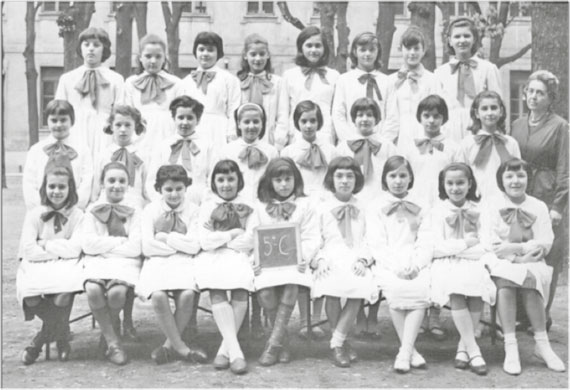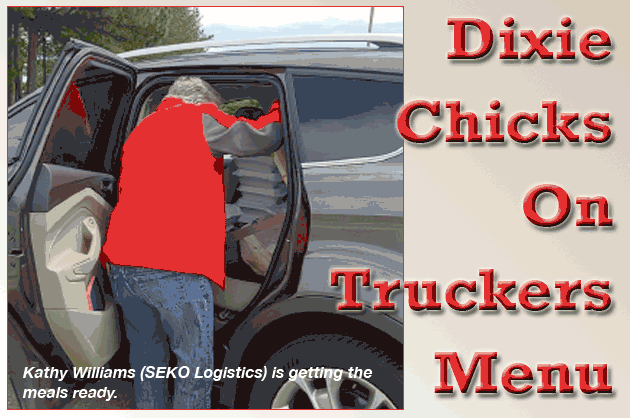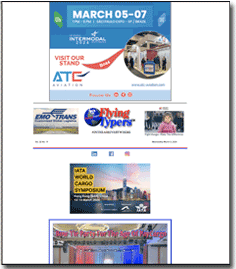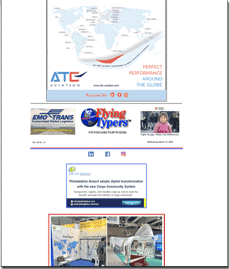In a perfect world the following few
lines would just make no sense. Yes, indeed, in a perfect world
. . . We are talking about how much logistics, and air cargo in
particular, is missing by overlooking women’s skills, but we are doing
this sideways, as it is convenient at the Flying Typers. Women’s
skills can be ignored knowingly or as a habit, in any case it is a missed
opportunity at best. This is not the main concept of this article, but it
cannot be ignored if you wish to fully understand its content.
An
accomplished businesswoman speaks hereunder and teaches us a few lessons.
Listening to Donna Mullins is a learning curve. There was so much to learn!
Instantly, my memory went all the way
back to my elementary school: “mani in seconda” [i.e. hands
in second positions] would have said my teacher in 1958. This picture –
not my class, it is just internet repertoire, with thanks to those who posted
this interesting material from a school in Milan in the ’50’s
– shows the various positions of the hands (mostly wrong actually,
according to the rather strict disposition we were supposed to comply with).
Obliging kids in class to keep different positions with their hands was
an expedient to deter any wrongdoing. We were 47 six-year-old restless kids
that a fine lady, our teacher, was trying to contain within the boundaries
of safety whilst at school in our classroom. In those days, education was
mostly in the hands of women. In a way I am grateful for this, as this was
such a perfect lesson in my youth.
 |
Accordingly, this story is much more about
ladies and their role in our business than about 1958. So, let’s
get started.
This is what Geoffrey had to say when we
were talking about the importance of women in our lives: “I
was brought up by my mother and grandmother.  As
a publisher, I have always been keen on advancing women based on watching
those two going to work in Manhattan from our home in Queens near Idlewild
Airport (JFK) and hearing of the trials and tribulations of being a woman
in business during the 1940s and 50s and onward. So 50 years ago (almost)
when Air Cargo News began in March 1975 we started looking for women in
the business and discovered Maria Canino (left) of Kuwait Airways at JFK
and wrote about her. Ever since we have sought out women and brought them
forward. I don't pretend to be any expert here, but I do think as an industry
much more could be done to help women than just scheduling a women’s
panel at trade shows.” As
a publisher, I have always been keen on advancing women based on watching
those two going to work in Manhattan from our home in Queens near Idlewild
Airport (JFK) and hearing of the trials and tribulations of being a woman
in business during the 1940s and 50s and onward. So 50 years ago (almost)
when Air Cargo News began in March 1975 we started looking for women in
the business and discovered Maria Canino (left) of Kuwait Airways at JFK
and wrote about her. Ever since we have sought out women and brought them
forward. I don't pretend to be any expert here, but I do think as an industry
much more could be done to help women than just scheduling a women’s
panel at trade shows.”
This a beautiful mind’s cry for help
and justice, at least this is what it sounds to me. Just listen to Geoffrey
genuinely thinking of the advancement of the industry he so much loves!
There is nothing else there and there is all that it takes. This is the
very essence of the entire story: it is not about women per se, it is
about the industry and the missed opportunities that ignoring their skills
and specialities entails. I cannot agree more. I started in this industry
when the two largest companies in town (Turin) were run by women, my boss
was a woman and the heap of knowledge I have received from them in the
early ’70’s is simply limitless. In between, I think something
went wrong and I still cannot understand what and where, because nowhere
is precisely the same in the world at this point in time. In 2024 we live
in a world where it is not pointless to discuss the role of women in air
cargo (and logistics at large) and it does make sense to question the
fact that their role is not adequately recognised. That is what I meant:
in a perfect world . . . well, it ain’t perfect.
On this point, I daresay the only ray of
sunshine I see from my window comes from my beloved FIATA. Not only the
Geneva Secretariat banks on the work of an almost entirely female workforce,
but in the last six months I have seen this group of ladies often take
the floor and represent the association in public at different events.
This is a very positive development in my view and surely FIATA’s
DG, Stéphane Graber, has been working hard with my former association-employer
to achieve this result. Yes, promoting women in the industry, in public
in particular, despite their obvious skills and qualities, is still a
job in this day and age and, boy, I know what I am talking about
. . . Kudos to FIATA for what they are doing in this regard.
Geoffrey went further in this comments:
“I just know we can do better and I know the women in our readership
by and large appreciate that we may be a bit dumb, but we are trying to
tell their story. Marco, you are going to talk about Donna Mullins. Donna
is a genuine feminist and can spot the real people a mile away. A trade
show is no excuse for indecorous behaviour, but that is exactly what air
cargo is in danger of falling into: the longer it allows women’s
issues to be advanced and discussed at meetings with no action or what
passes as advancement thinking action, which you can detect as fake a
mile away . . . ”
According to the website Globalia: “Even
a few years back, the transportation and logistics industry used to be
a completely male-dominated sector. The poor perception of career opportunities
is a significant deterrent in this regard. In spite of representing around
half of the global population, the role of women in this male-dominated
sector used to be marginal for decades. Nevertheless, in the last few
years, the increased focus on inclusion and gender diversity has seen
an increase in women professionals in this sector, as well as in the efficiency
of the industry. This only proves that the e-supply chain industry, as
a whole, surely could do well with a more diverse workforce.”
If this final sentence assessment sounds
familiar, it should indeed. The words in one form or another serve as
what most of us remember as takeaway from our last women empowerment sessions
at one of our trade shows.
As we know today Donna works for Kale Logistics
Solutions as their person in the USA, after serving for many years as
a totally engaged person in the business. Just another voice amongst many
others, about a fine person decent and wonderful, she would be very helpful
for the case of women in industry as you may have recently read in our
– let me call it inclusive, not exclusive – story about women
on the Indian Air Cargo scene.
Now, after the meeting in Mumbai we just
mentioned, this is Donna Mullin’s own voice, caught in the act:
“The Air Cargo 2024 Conference is a wrap and it was packed
with information about air cargo possibilities and challenges. The opening
address by Captain Houston Mills, UPS, was fantastic . . . my
best take-a-way was his three simple suggestions on Gung Ho! Leadership
model:
1. The
Spirit of the Squirrel – Worthwhile work.
2. The
Way of the Beaver – Independent work.
3. The
Gift of the Goose – Encouraging work.
 In
2020 during the early days of the pandemic Donna marshalled a brave
band of ladies to venture out with face masks, rubber gloves and proper
social distancing to Hartsfield Jackson International Airport (HIJA)
in Atlanta, where they delivered food to truckers who had nowhere
else to go. In
2020 during the early days of the pandemic Donna marshalled a brave
band of ladies to venture out with face masks, rubber gloves and proper
social distancing to Hartsfield Jackson International Airport (HIJA)
in Atlanta, where they delivered food to truckers who had nowhere
else to go. |
Air Cargo Facilities
Challenge
“There was much focus on airports
and cargo throughput this year. Maybe because Congress has now been intimately
introduced to the terms “air cargo and supply chain” since
the pandemic and how the air cargo industry truly helped to save the world
– really. The rapid movement of PPE and other needed supplies to
combat COVID literally made the news. People who never had any idea about
the business we do were suddenly aware of the importance of air cargo
and the expedited efficiencies needed. So much so, there was a release
of funding to airports for improvements in the Infrastructure Bill of
2023 totalling $25 billion . . . sadly, only a very,
very small portion of that will be dedicated to cargo.
“During the discussion panel
on Air Cargo Facilities Development Challenges several areas were identified
from weather, location, land space, municipalities, need, is there an
airport cargo manager, and communication. Identifying the need was not
so difficult, however, other challenges were bigger barriers. I suppose
what I heard most was communication and when it starts (or in many cases
does not) with the whole stakeholder community. Airports serve passengers
and cargo and because cargo does not get to vote or complain, cargo is
sometimes the afterthought in airport development and strategic planning.
Airports need to realize the importance of cargo and the yield it brings
to passenger carriers, as well as how much economic impact air cargo has
in the immediate and surrounding regions of the airport. Kale Info Solutions
being a provider of Cargo Community Systems, I was also very pleased to
hear that when those communications start, and they should start very
early in the planning process, technology providers such as ourselves
must be at the table to help drive digitization to bring about more efficiencies
in air cargo throughput. Global Regulations and Trade Impacts panel brought
us updated information and recommendations for ensuring that our air cargo
transactions are compliant with, not just U.S., but globally set regulatory
requirements in other countries – even those that our cargo may
only be transiting through. One of the most recent European air cargo
rules is the ICS2.0 requirement. The need for electronic data interchange
is broadened with advanced data requirements being expanded. Here too,
Kale Info Solutions, being a technology provider, can assist forwarders,
handlers, and airlines with advanced shipment data using our ACS (Airport
Community System) platform.”
Women In Discussion
Donna Mullins was clearly happy to note
that “The Women’s event was fabulous. The attendance to the
session – both women and men – just keeps growing which is
wonderful to see. Impostor syndrome: I had never heard of it before. But
if you want more information, just search for it on your favourite IE
engine and you may find that at some point in your life you may have had
one of them. The Five Types of Imposter Syndrome discussed by the panellists
and attendees were:
1.
The Perfectionist
2.
The Expert
3.
The Genius
4.
The Soloist
5. The Super-person
P.S. – imposter syndrome ain’t just for girls!"
Airport Cargo Congestion
Then Donna Mullins continued on a more personal
tone: “I was honoured to be on the panel ‘Navigating the Future:
Technologies for Mitigating On-Airport Cargo Congestion’. Since
developing and implementing technology for cargo congestion is a prime
solution provided by Kale Info Solutions, I felt quite at home with my
fellow colleagues. We discussed what an Airport Community System/Air Cargo
Community System/Cargo Community System is. As you can see, with it having
multiple names, what it does exactly, and how, can also be confusing.
We discussed the stakeholders of the air cargo logistics chain and how
each of them could benefit by implementing more technology to increase
efficiencies within their respective business disciplines. We talked about
how airports can play a role in adopting an ACS. Some airports do not
have dedicated cargo managers and that causes challenges for the airports
and their roles. Another factor in the airport’s role is how the
airport is set up – whether they are a landlord only, with limited
authority to require their tenants to use a system, or if they have the
authority to choose a system and require the community to use it. We also
discussed, is it a ‘community system’ if only one house is
participating in the platform and not the whole neighbourhood? Kale has
been instrumental in providing the technology engine for WFS’s ‘Time
is Money’ Dock Management Program and we currently have our solutions
at JFK, ATL and BOS stations with other locations to be rolled out this
year. AGI has chosen a different provider and in DFW they have a different
provider, too. DFW is the only U.S. airport that I know of which has purchased
a system. PHL and RFD have contracted with Kale to offer our system to
the stakeholders, but it was not procured by the airports. RFD will require
that cargo stakeholders doing business in their airport to use the Kale
system, however PHL will not. The success of the community system in these
airports will be very dependent on the community’s willingness to
participate – which, with all the benefits that can be obtained
with a cargo community system, who wouldn’t?
“Other discussions of the panel included
how the government can participate and should. For example, a forwarder
can have a completely paperless air cargo shipment, but one government
agency still requires a paper document – TSA requires the CSD to
be tendered in paper form to the handler (FAA also still requires a paper
DG) – most all other government agencies with hold, release, or
refusal authority are participants in ACE and receive and send electronic
data to the stakeholder. With governments wanting upstream and advance
data, the implementation of a cargo community system can help to accomplish
that for better security targeting – and Kale has the solution to
connect these stakeholders electronically transmitting ASI in a secure
and encrypted platform.
“It was also a time for myth busting.
One of the panellists commented that the reluctance of an ACS was the
fear of data sharing. I assured the audience that with Kale’s ACS
in no way would carrier A see any of carrier B’s data and that the
term data share is within and among authorized trade partners only.
Clear Roads At Airports
“The final session of the conference
was ‘The Airport Throughput Challenge & How Do We Manage Truck
Congestion’. My simple and profound answer to this question: invite
Kale Info Solutions to your airport cargo table and let us help with our
digital solutions. We did an ESR for one of our trucking customers and
found that with the Kale ACS they saved a substantial amount of driver
labour cost, reduced CO2 emissions and the carbon footprint significantly,
as well as saved hundreds of gallons of fuel because the drivers’
wait and dwell times were reduced and cargo throughput increase all with
technology.”
This excerpt is so dense and meaningful
I simply could not interrupt or interfere in any way or manner. This is
indeed a good lesson: a shining example of clear thinking, hand-on approach
and wise, selfless advice provided in large amounts to those who wish
to understand. It makes perfect sense that these statements come from
a lady, as it is so typical for women to be profound, straight to the
point and purposeful. This is exactly what we need now, trinkets can wait
for dusting when there is time . . . Who can do better?
We all listened with pricked-up ears and “mani in seconda”.
Donna concluded her contribution in this
manner: “Thanks so much for inviting me to give my inputs on the
AC2024 event and in my final thought I’ll say, it is no secret that
the air cargo logistics value chain needs to embrace more technology as
a community. Some stakeholders are well into their automation journey,
and some are still lingering. Regardless of where the stakeholder is in
their digitization process, Kale Info Solutions can assist them.”
So Donna Mullins closes her remarks on an
appeal for more technology. Let me now jump into this discussion, if our
readers allow, for a couple of lines. All too true, and, dear me, yes,
we need more technology. Above all, we need women in the business who
can show us, like Donna Mullins, the way forward.
My personal wish? More constructive thinking,
we need technology, we need investments; of course we need more women
at the steering wheel, but we need many more people, regardless of their
gender, with clear, selfless thinking to advance the industry of the future.
Women and men who are willing to contribute and leave a legacy to their
successors after they have left, a legacy that is a wealth of knowledge
rather than a burden for development.
Nobody is here forever and the best we can
do is to build new generations of operators, in hope that what we have
done contributes to their better conditions in future. This is what women
have done for time immemorial and continue doing today as always. Women
in logistics have a new generation of logisticians to foster. If the younger
women and men in logistics listen to their wisdom and learn from them,
the world of logistics and air cargo in particular will be a better place
for everybody.
Marco L. Sorgetti/GDA
|





